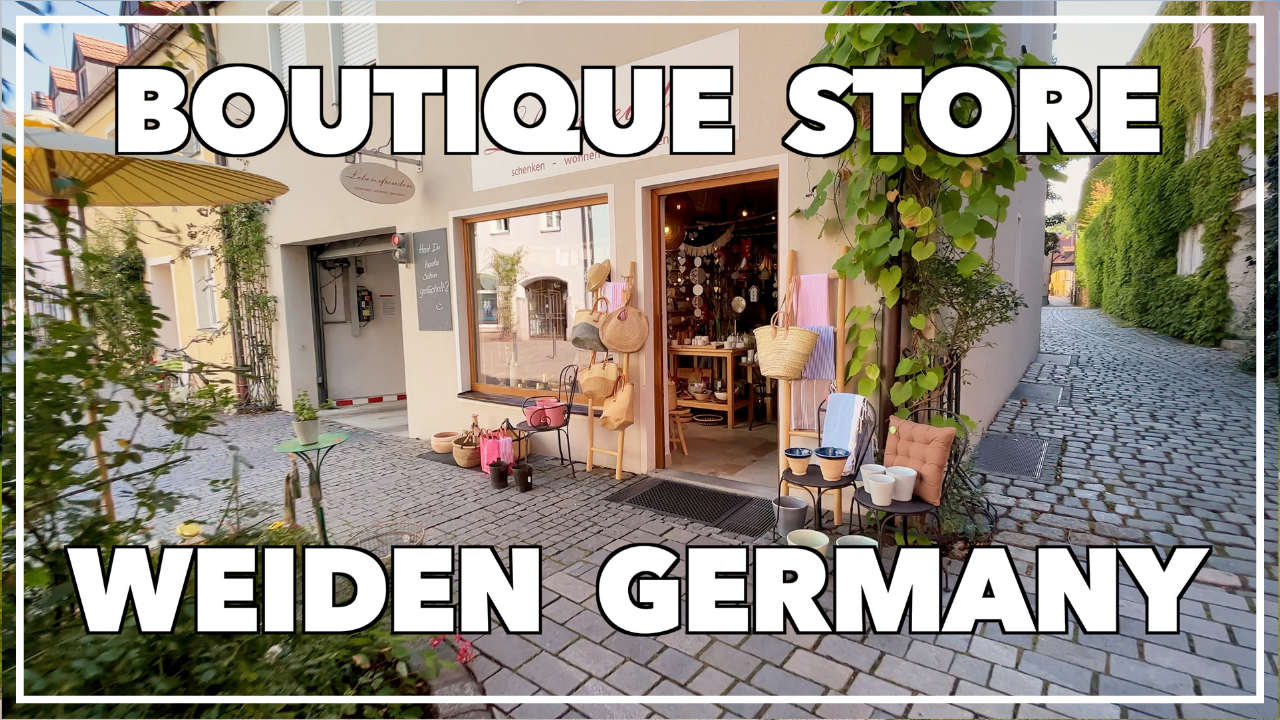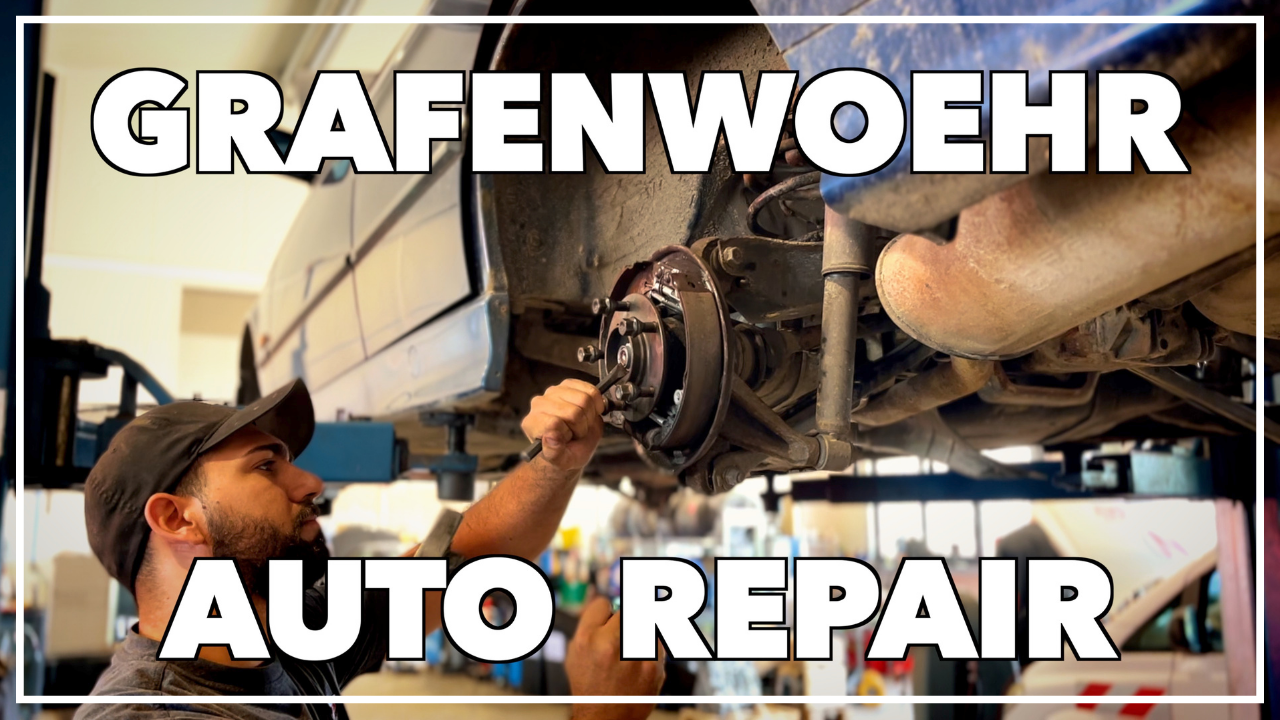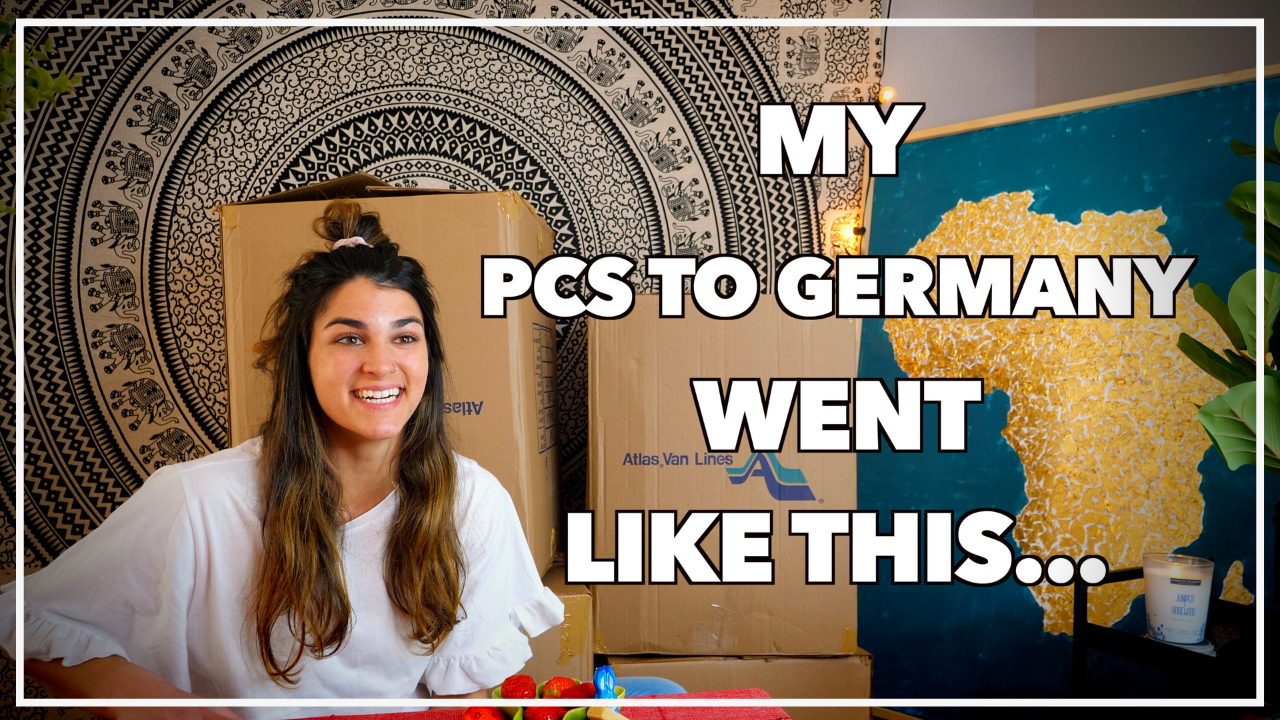When you first move overseas, the US military will give you a separation table with the breakdown of how to recycle in Germany. Glass – Cans – Paper – Plastic – Yard Waste, there is literally a recycle category for every piece of trash!
But no worries, I had my good Bavarian friend Fran, from Soldiers and Saurekraut, take us around the city and explain all you need to know!
Germany waste separation
Let’s get one thing straight, the Germans are serious about their recycle etiquette. As an American, it takes some getting used to, so why don’t we go over the basics.
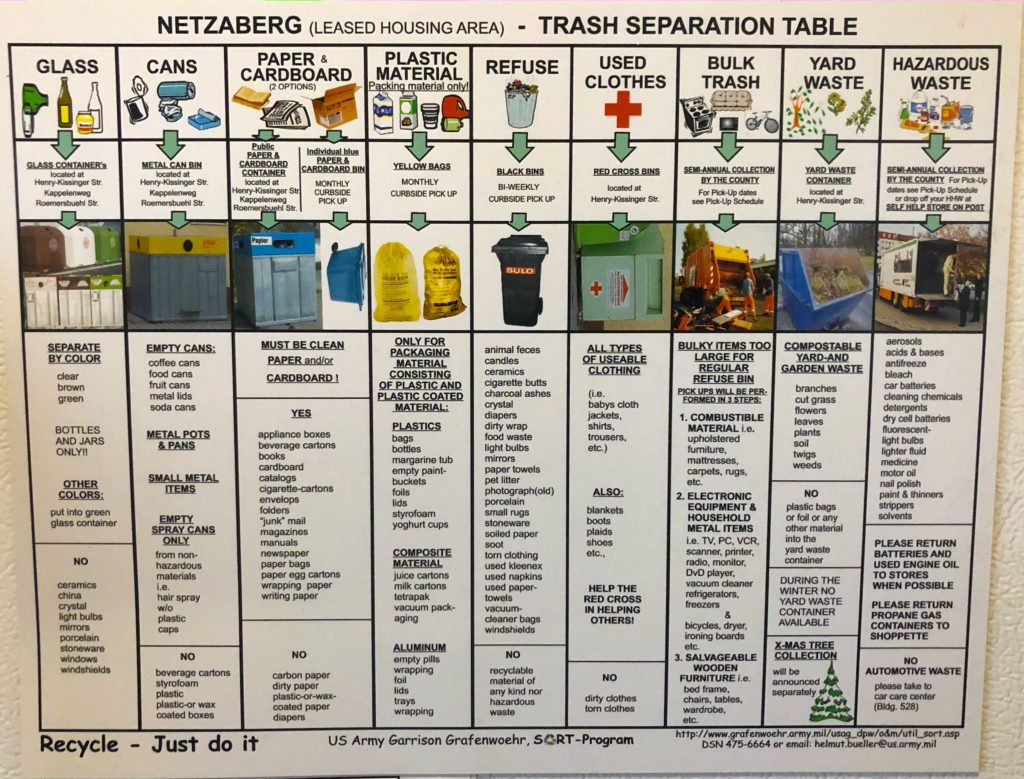
First off, it’s super helpful that the recycling centers have specific, color coded sections for cans, plastic, paper, cardboard, glass, and yard waste. These are the most common items to separate at your local recycle bin (on and off base).
It’s also worth mentioning that these are standard rules for recycling in Bavaria Germany, other states may have slightly different rules and expectations.
Prepare for five to six bins for all the standard items, including food waste. In my house, we have a bin for glass, plastic/aluminum, paper, yard waste outside, and normal refuse. Overwhelmed yet?
Although it may seem daunting at first, you will quickly learn how to separate your items, and recycling in Germany will become second nature.
Are you PCSing to Germany? Get prepared with our Ultimate PCS Checklist!
Plastic Material and Yellow Bags
In Germany, they use yellow plastic bags for packaging material consisting of plastic and plastic coated material. These bags can be picked up (for free) at a local bakery (who doesn’t want to do that?!). For brownie points, you can ask in German, “Haben Sie Gelbe Säcken?”
You can also find free yellow bags on base at Self Help, the Rat Haus (City Hall), Gugel, Bergler Gas Station, and Nahkauf Pappenberger.
Yellow bags have a home for non-plastic items as well. Aluminum cans and styrofoam are also acceptable items for yellow bag usage.
Yellow Bag Items: Plastics – bags, bottles, margarine tub, empty paint buckets, foils, lids, styrofoam, and yogurt cups.
Composite material – juice cartons, milk cartons, tetrapak, and vacuum packaging
Aluminum – foil, lids, and trays.
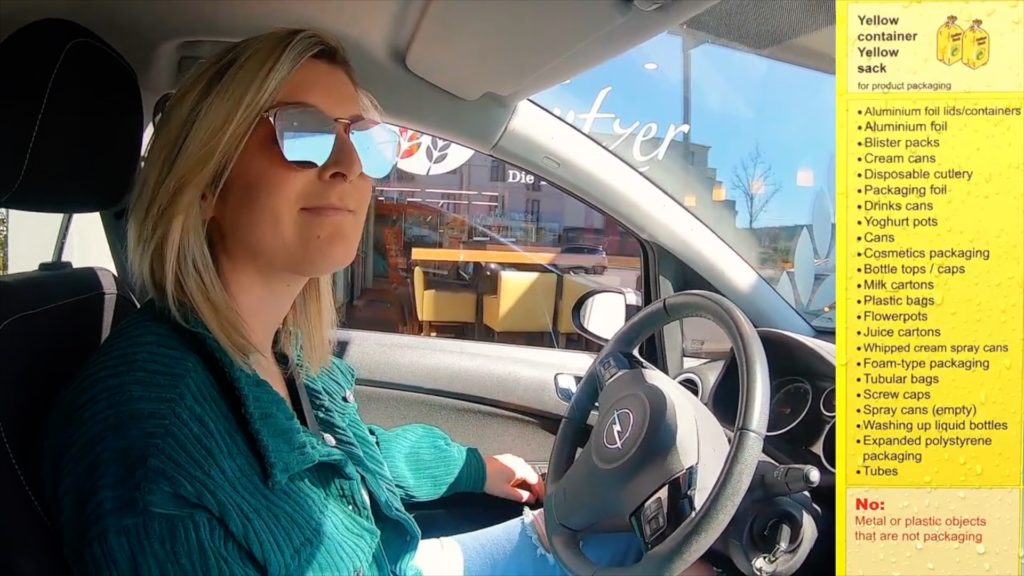
Cans
Cans are definitely not a plastic material, but metal and aluminum cans are also considered yellow disposable items.
Canned Items Include: Empty cans – coffee cans, food cans, fruit cans, metal lids, and soda cans.
Metal pots and pans – empty spray cans from non-hazardous materials such as hair spray
Glass Materials and Glass Bottles
Glass bottles and jars are recycled by color – clear, brown, and green. You can recycle other colored bottles, but they will also go into the green container.
There is a long list of what NOT to recycle in this container: ceramics, china, crystal, light bulbs, mirror, porcelain, stoneware, windows, and windshields.
Keep in mind, some of these glass bottles can be recycled at your local Getränkemarkt (beverage market) or grocery store in exchange for money back. More of that in a bit.
Paper and Cardboard
You have two options for recycling paper and cardboard. One is a public container, and the other is a blue garbage bin given by a waste disposable company (ie: garbage man). The big blue trash cans from the garbage man are picked up on a monthly schedule.
Paper Items Include: Envelopes, magazines, paper bags, newspapers, books, paper egg cartons, wrapping paper, catalogs, cigarette cartons, folders, junk mail, manuals, and writing paper.
Cardboard Items Include: Appliance boxes, beverage cartons, and cardboard.
Refuse
This is your everyday trash and it’s stored in a normal trash can in your home, which is then transferred to a large garbage bin outside (provided by the garbage man), and then picked up on a monthly schedule.
Refuse Items Include: Animal feces, candles, ceramics, cigarette butts, charcoal ashes, crystals, dirty diapers, etc.
Compostable Yard and Garden Waste
These bins are great for branches, cut grass, flowers, leaves, plants, soil, twigs, and weeds. When dumping, make sure to remove the waste from any plastic or foil, they usually go directly into a designated yard waste bin.
Get Our FREE Checklist! ✅
Used Clothing
You can find kiosks to drop off used clothes and shoes all over the city. Most of the kiosks will be located in the parking lots of large shopping centers. Make sure to put them in a plastic bag and seal them up so your clothes/shoes will not fall out.
Used clothes include – children and adult clothing, blankets, boots, plaids, and shoes. Nothing dirty or torn is allowed to be donated.
Hazardous Waste
Wondering what’s considered hazardous waste? Well, that would be batteries, lightbulbs, nail polish, leftover paint, etc. These items can be taken to OBI, REWE, Aldi, or dm for recycling. There will be a clearly marked container right as you enter the store to place them in.
Hazardous waste has a semi-annual pickup date. Although only in German, we use the Neustadt Waldnaab Abfall App to find our local pickup calendar. You’ll need to put in your city, and use some color coding techniques to figure out the dates of pickup throughout the year.
They’ve also got a pretty helpful breakdown of the different types of waste in Germany.
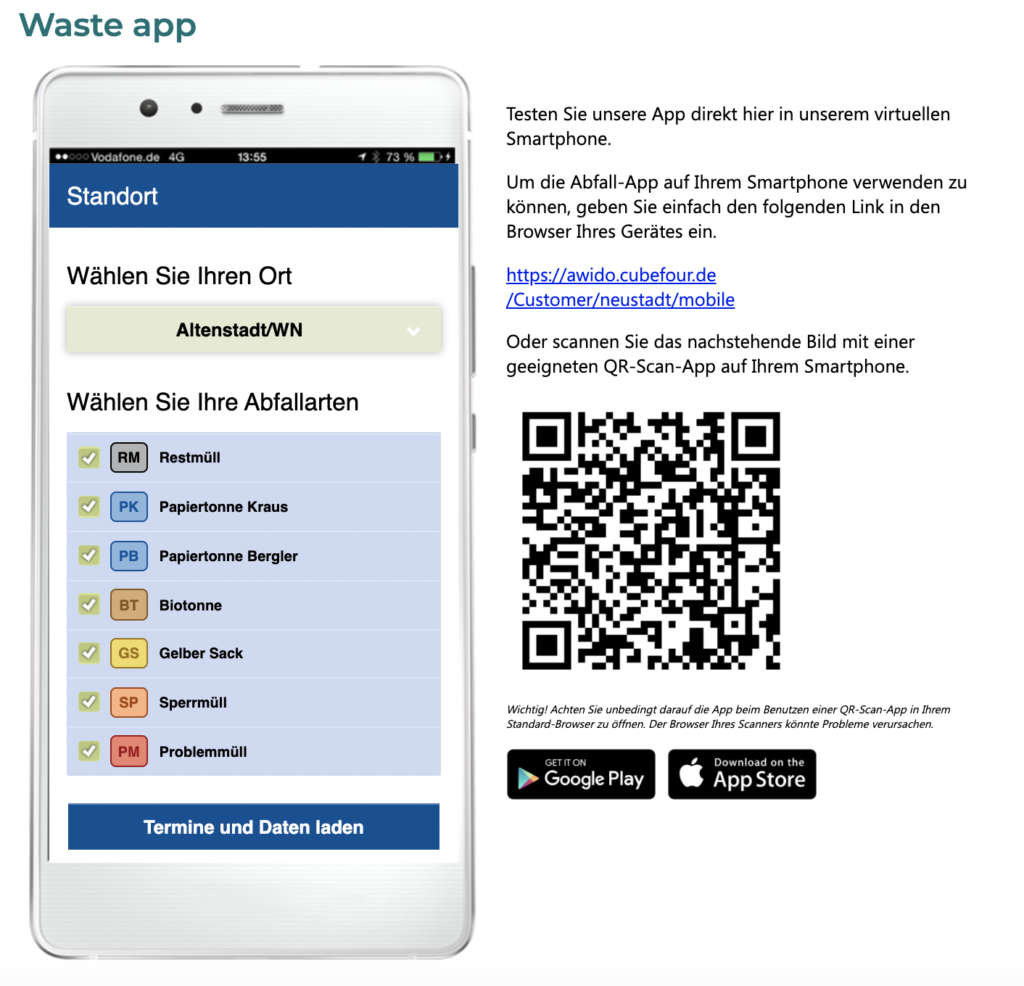
Bulk Items
When it comes to bulk trash, there’s a semi-annual pick-up. And if you’re off post, you can place the items outside your house. You can also call them to have them pick it up for a fee (phone 09602/793530). If calling someone in Germany is still scary for you, there’s also a bulk items bin on base!
There are two types of bulk items:
Combustible Material – upholstered furniture, mattresses, carpets, rugs, etc.
Electronic Equipment and Household Metal Items – TV, PC, VCR, scanner, printer, radio, monitor, DVD player, vacuum cleaner, refrigerators, freezers, bicycles, dryer, ironing boards, toys, household equipment/products, sports equipment, spare parts, tools, etc.
*Christmas trees are also considered bulk items, but are picked up in the winter after Christmas. If you’re on base, look for designated areas for drop off in January. Off post residents usually place their trees in a designated neighborhood location.
On-Base Recycling
For on-post housing, you have scheduled pick-ups for the following: paper, cardboard, and plastic. Each bin has a once-a-month curbside pick up, and refuse is bi-weekly.
On Grafenwoehr army base, there’s a recycle center where you can throw away just about anything. They have designated areas and signs that tell you what and where to throw away your trash.
The on-base recycle center includes: paper/cardboard, glass, bulk trash, tires, wooden furniture, electronics, scrap metal, dry cell batteries, spray cans, printer cartridges, detergents, etc.
Freecycle & Thrift Store
The freecycle program provides donated household items to USAG Bavaria military members at no cost. Freecycle items can include kitchen appliances, furniture, bathroom accessories, and electronics.
There is a thirty item limit to each shopping cart and you must be an ID cardholder to use the program.
The Thrift Store is another option for donating items to be recycled around the community. Proceeds from the store go to scholarships, grants, and private organizations.
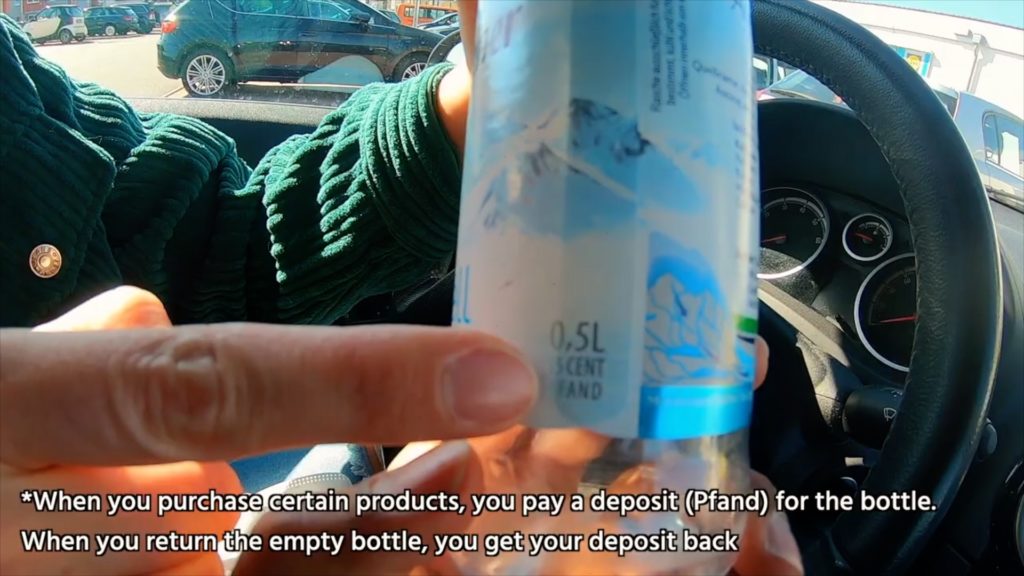
Germany Bottle Recycling Machines
These recycling machines are really the coolest! When you recycle certain bottles in Germany, you have the opportunity to take your plastic/glass bottles into a grocery store or Getränkemarkt for money back.
The first thing you need to do is make sure you can actually recycle the bottle. Look on the bottle for a small recycle sign, this is called the “pfand system.”
The pfand systems allows you to bring back a bottle for the amount listed or for money off of your next purchase. If you have a large amount of bottles, you can place them in the bottle machine for a pfand ticket. This ticket is also worth money back or money off your next purchase.
For every plastic bottle, you get 0.25€, for every glass (water) bottle you get 0.18€, and a really sturdy plastic bottle will get you 0.15€.
And, there’s more great news! You also receive money back for some glass beer bottles. When you return empty beer bottles/cases, you will see the amount you received back on the receipt.
Here’s the breakdown:
Case of 20 empty bottles – 3.10€
Normal beer bottle – 0.08€
Case without bottles – 1.50€
Case of 20 “pop-off” bottles – 4.50€
Half case of 10 bottles (Paulaner) – 2.25€.
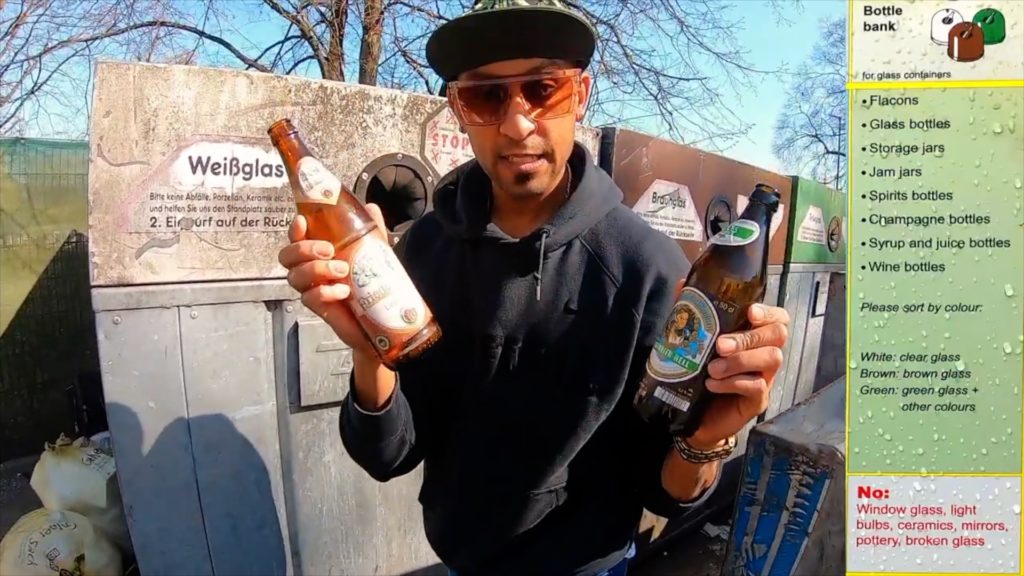
As you can tell, recycling can be both stressful, yet rewarding in Germany. But like all things, the more you practice, the better you’ll get!
To learn more about PCS prep, stay prepared with my Ultimate PCS Checklist, or subscribe to the channel for more local insights!
RELATED VIDEOS
